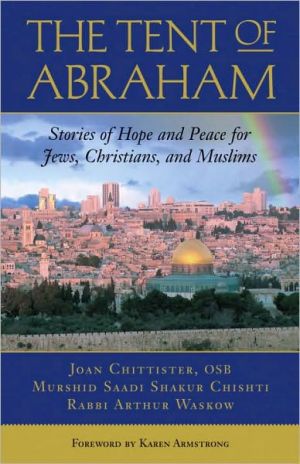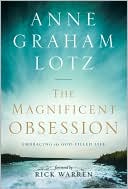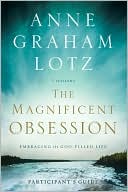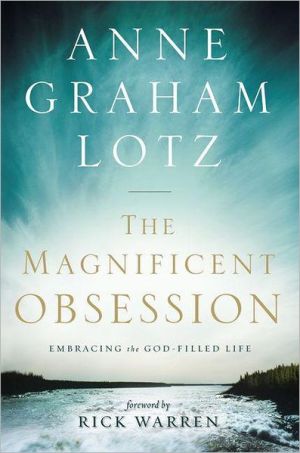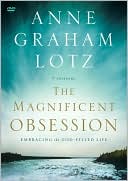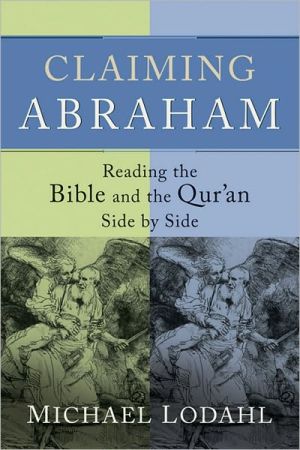The Tent of Abraham: Stories of Hope and Peace for Jews, Christians, and Muslims
In recent years there has been an explosion of curiosity and debate about Islam and about the role of religion, both in the world and in the Arab-Israeli conflict. The numerous books published on these questions speak to issues of politics, history, or global security. None speaks to the heart and the spirit, and yet millions of people experience these issues not as political, economic, or intellectual questions but as questions of deep spiritual, emotional, and religious significance.\ The...
Search in google:
In recent years there has been an explosion of curiosity and debate about Islam and about the role of religion, both in the world and in the Arab-Israeli conflict. The numerous books published on these questions speak to issues of politics, history, or global security. None speaks to the heart and the spirit, and yet millions of people experience these issues not as political, economic, or intellectual questions but as questions of deep spiritual, emotional, and religious significance.The Tent of Abraham provides readers with stories that can bring all the faiths together. Written by Saadi Shakur Chishti, a Scottish American Sufi, Rabbi Arthur Waskow, an American Jew, and Joan Chittister, a Benedictine sister, the book explores in accessible language the mythic quality and the teachings of reconciliation that are embedded in the Torah, the Qur’an, and the Bible. It also weaves together the wisdoms of the Jewish, Muslim, and Christian traditions into a deeper, more unified whole.The Tent of Abraham is the first book to tell the whole story of Abraham as found in Jewish, Christian, and Muslim sources and to reenergize it as a basis for peace.“If you are going to buy only one interfaith book, this has to be the one.” —Rabbi Dr. Michael Hilton, Manna: The Forum for Progressive Judaism, Winter 2007“Want an antidote to tragic headlines about religious conflict in the Middle East? Try this remarkable new book. A celebration of religious diversity that is likely to leave readers more optimistic about the potential for peace.” —David Crumm, Detroit Free Press, 2007Joan Chittister, OSB, is a best-selling writer and lecturer. She lives in Erie, Pennsylvania. Rabbi Arthur Waskow is the director of The Shalom Center in Philadelphia and author of numerous books, including Seasons of Our Joy (Beacon/ 3611-0/ $18.00 pb) and Down-to-Earth Judaism. Saadi Shakur Chishti (Neil Douglas-Klotz) is an internationally known Sufi scholar and writer. His most recent book is The Sufi Book of Life. Publishers Weekly The three coauthors, representing the three major Western faiths (Judaism, Christianity and Islam), explain each religion's basis for a monotheistic multifaith movement by delving into ancient stories. Waskow, a rabbi, offers intellectual perspective on the Abrahamic story, explaining symbolic themes of Judaism. The Torah, for instance, is said to have been written with "black fire on white fire": The white fire is the blank spaces, where Jews of each generation are meant to read and reread the language contained in the black fire. Catholic sister and popular writer Chittister describes the Middle East conflict with compelling anecdotes from her own firsthand experience in founding an Israeli-Palestinian women's group. Finally, Sufi writer Chishti discusses the spiritual content and opinions related to Islam. The authors explore provocative questions, such as which son Abraham meant to sacrifice (Isaac, ancestor of the Jews, or Ishmael, ancestor of the Muslims) and the nature of the relationship between Sarah and Hagar: were they devoted friends, rivals or simply property of Abraham? Evoking the "open tent" policy of Abraham, who welcomed all visitors to his home despite social mores, the coauthors air out all options. (July) Copyright 2006 Reed Business Information.
Foreword : Abraham : meeting guests, meeting GodIntroduction : hearing the voices of one who hearkensTwo tellings of Abraham's journey1Abraham's journey in the Bible and the Jewish Midrash3The story in Islam18Pt. 1Jewish interpretations of Abraham's journey29Pt. IIChristian interpretations of Abraham's journey79Pt. IIIMuslim interpretations of Abraham's journey125Epilogue : from hearing to doing175Resources for practical use in Abrahamic peacemaking179How to pitch your own tent183The journey told anew191The tent of Abraham, Hagar, and Sarah197The sacred season of Abrahamic sacred seasons201Why Hagar left207
\ Publishers WeeklyThe three coauthors, representing the three major Western faiths (Judaism, Christianity and Islam), explain each religion's basis for a monotheistic multifaith movement by delving into ancient stories. Waskow, a rabbi, offers intellectual perspective on the Abrahamic story, explaining symbolic themes of Judaism. The Torah, for instance, is said to have been written with "black fire on white fire": The white fire is the blank spaces, where Jews of each generation are meant to read and reread the language contained in the black fire. Catholic sister and popular writer Chittister describes the Middle East conflict with compelling anecdotes from her own firsthand experience in founding an Israeli-Palestinian women's group. Finally, Sufi writer Chishti discusses the spiritual content and opinions related to Islam. The authors explore provocative questions, such as which son Abraham meant to sacrifice (Isaac, ancestor of the Jews, or Ishmael, ancestor of the Muslims) and the nature of the relationship between Sarah and Hagar: were they devoted friends, rivals or simply property of Abraham? Evoking the "open tent" policy of Abraham, who welcomed all visitors to his home despite social mores, the coauthors air out all options. (July) Copyright 2006 Reed Business Information.\ \
